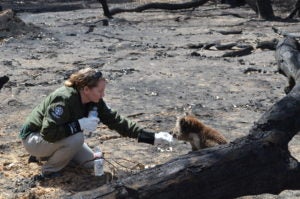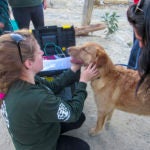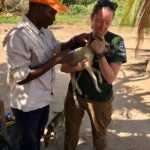
Note: See ENDS at bottom for the latest videos and updates on our rescue efforts.
Kangaroo Island, South Australia – Animal charity Humane Society International has deployed a disaster response team to Kangaroo Island on a search and rescue mission for wildlife survivors of the bushfires that have scorched over one third of the island. As HSI surveys the devastation first hand, the charity welcomed today’s announcement by the Australian government, pledging aid for species and habitat recovery.
HSI/Australia CEO Erica Martin said: “The land we’re searching is utterly scorched with charred animal bodies everywhere. It is very confronting to see the extent of the loss of wildlife. At one area, which was badly burned a week ago, the scenes were nothing short of apocalyptic. There we only found one living koala amongst thousands of bodies of koalas, kangaroos, wallabies and birds. So as we prepare to set out again to search for surviving animals, we warmly welcome this $50 million pledge. A substantial elevation of funds to the environment will need to be sustained for the long term.”
HSI’s team — led by Kelly Donithan, who is a global expert in disaster response — is building water and food stations to sustain uninjured wild animals in the area, as well as rescuing survivors suffering from burns, injuries, smoke inhalation and other physical or mental trauma.
The first reports from Kangaroo Island are harrowing to read; however, despite the devastation, the team has found and provided aid to koalas, kangaroos and possum survivors. Local groups on the ground with whom HSI is working are battling around the clock, especially Kangaroo Island Wildlife Park, which is taking in and caring for burned and injured animals.
HSI’s senior specialist in disaster response, Kelly Donithan, said: “These are some of the toughest scenes I’ve ever witnessed as an animal rescuer: the bodies of charred animals as far as the eye can see. But as we set out each day on search and rescue, we’re still finding animals alive, injured, dazed or traumatised, and it’s such a relief to be able to give them immediate life-saving assistance. We’ve seen kangaroos with devastating burn injuries and dehydrated koalas gasping for water. Amidst all this death, every time we find an animal alive it feels like a miracle. The local sanctuaries here are working around the clock, so we’re bringing in every animal we find in need of veterinary care and then heading straight back out to save more.”
HSI’s team is assessing every animal survivor they find to decide if they can be left in-situ or taken into care. If animals are uninjured and have access to a reasonable food source, it is far less stressful for them to be left with a water station so that the team can check back on them later.
Ms. Donithan explained: “Obviously, the goal is to keep animals in the wild as much as possible. Unfortunately, the landscapes are so decimated that for many this hasn’t been an option because there is nothing left for them to eat or drink, so they need to be taken in for care. Sadly some animals are so badly burned that euthanasia is the only option. We found one kangaroo so burned her feet and tail were nothing but exposed bones. She was in a terrible state and must have endured such suffering, so I’m grateful at least that she didn’t have to die out there alone and in pain.”
Despite the best efforts of firefighters, rescuers are seeing new fires continuing to spring up, with animals fleeing with burns. One possum was rescued by the team after emerging from flames as the team was stopped waiting to see if the road ahead would become passable or whether they needed to find an alternate route.
Humane Society International/Australia manages a network of 600 wildlife sanctuaries across the country as part of its Wildlife Land Trust. Many of these sanctuaries have been devastated by the fires or are experiencing an influx of patients to care for. With assistance from Humane Society International, HSI/Australia will provide funds, supplies and support to Wildlife Land Trust sanctuaries and other wildlife carers across fire zones.
Evan Quartermain, HSI/Australia’s head of programs who manages the WLT, said: “It is extremely emotional. I can barely describe it. In some places you can’t walk 10 metres without coming across another carcass. Humane Society International/Australia’s bushfire fund is paying for emergency truckloads of water and supplementary feed for rescued wombats, kangaroos and flying foxes in care impacted by fire and severe drought across the country. We have been able to fund the building of additional rehabilitation enclosures for koalas and other wildlife and with generous donations from around the world we are letting wildlife carers know we are here to support them for the long haul.”
ENDS
Watch:
Australia Fires: Helping animals in crisis,Australia Fires: Helping koalas in need, Australia Fires: Rescuing animals in need and Facebook Live updates from our rescuers in the field.
Read a recent blog entry by HSUS President & CEO Kitty Block.
Donate to our Animal Rescue Fund at hsi.org/aid.
For more information about our response, see our Australia fires faqs.
Download images and b-roll of animal rescue here.
For interviews with HSI’s rescue team on Kangaroo Island, please call Rhiannon Cunningham in Sydney on 0449 803 492 or (02) 9973 1728 and email rhiannon@hsi.org.au, or Wendy Higgins in London, UK on +44 (0)7989 972 423 whiggins@hsi.org.
In the U.S., contact Nancy Hwa, nhwa@hsi.org, 202-676-2337 (direct), 202-596-0808 (cell).



